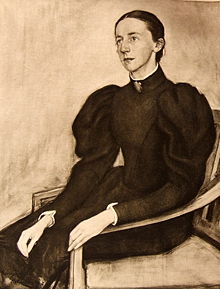Mathilda Wrede
Mathilda Augusta Wrede (born March 8, 1864 in Vaasa , † December 25, 1928 in Helsinki ) was a Finnish-Swedish aristocrat who devoted herself to improving the living conditions of prisoners and the underprivileged.
Life
Mathilda was the youngest child of Carl Gustaf Wrede and his wife Eleonora (née Glansenstjerna). Her father was the governor of Vaasa Province. Her mother died on Christmas Day 1864 when Mathilda was only nine months old. The older siblings had already moved out of their parents' apartment, and so she grew up with her sisters, Helena 16 years older and Johanna 6 years older. The household also included servants, nannies, etc. As the eldest daughter, Helena took on the task of bringing up the younger siblings.
The family lived in Vaasa, but their second home was the Rabbelung mansion in Anjala, southeastern Finland, where they spent the summer. At the age of seven, Mathilda came to school in Vaasa, where, unlike many other Swedish-speaking nobles, she also learned Finnish. When she was eleven, she went to the private girls' boarding school Hamina . After graduating from school at 15, she returned home.
Spiritual experience
By early 1883, Mathilda was depressed and plagued by headaches. At that time she attended events of the Swedish Missionary Union in Vasa with the lay preacher Carl Orestes. This is where 18-year-old Mathilda Wrede experienced her conversion . She avoided dances and distractions, and spent her time reading the Bible and talking. Her health also improved.
Prison labor
Since childhood, Mathilda had been used to seeing inmates working outside the prison on the farm of her father, the governor. Half a year after Mathilda's conversion, a prisoner was in the house doing repairs and she talked to him about matters of faith. To her surprise, he asked her if she would also go to jail to discuss it with others. Her father agreed on the condition that a guard be present. So she began proselyting prisoners with the permission of the prison governor.
After her father retired, she obtained permission to visit all of Finland's prisons from Adolf Grotenfelt, the senior director in charge of prison welfare in Helsinki. He hoped that their mission would also improve the prisoners' morale. Mathilda began her prison visits in Lappeenranta and Vyborg in 1885 and spent a lot of time visiting Finland's largest prison in Turku (Kakola).
Prison reforms
In addition to her evangelism, Mathilda also tried to improve prison conditions. Among other things, she drew attention to the lack of medical care for prisoners. In order to reach the political prisoners in particular, she reduced her religious message and supported calls for reforms. It caused a social scandal by disclosing information about prison conditions to the public. After 1900, the state prison administration saw Mathilda Wrede's activities as a threat to social peace.
Further activity
In the Russian Civil War , it did not support either party, but tried to improve the situation of prisoners of war and refugees and to mediate between the adversaries.
Remembrance day
December 24th in the Evangelical Name Calendar .
literature
- Ingeborg Maria Sick: Mathilda Wrede, an angel of the prisoners. JF Steinkopf, Stuttgart 1930 (12th edition)
- Evy Fogelberg: Fångarnas vän (Litteraturåret 1920) (4: e uppl Litteraturåret 1929)
- Evy Fogelberg: Bland fångar och fria (Litteraturåret 1922)
- Evy Fogelberg: Mathilda Wredes sista år (2: a uppl Litteraturåret 1929)
- (Hans Berneck), compilation: Selma Lagerlöf : Seven days from the life of Mathilde Wrede. From various sources and reports. Row: leaders and friends, 2; div. edition Anker, Berlin 1931–1937
Web links
Individual evidence
- ^ Mathilda Wrede in the Ecumenical Lexicon of Saints
- ↑ 47 pages. Original Swedish, see also web links
| personal data | |
|---|---|
| SURNAME | Wrede, Mathilda |
| ALTERNATIVE NAMES | Wrede, Mathilda Augusta (full name) |
| BRIEF DESCRIPTION | Finland-Swedish aristocrat |
| DATE OF BIRTH | March 8, 1864 |
| PLACE OF BIRTH | Vaasa |
| DATE OF DEATH | December 25, 1928 |
| Place of death | Helsinki |
